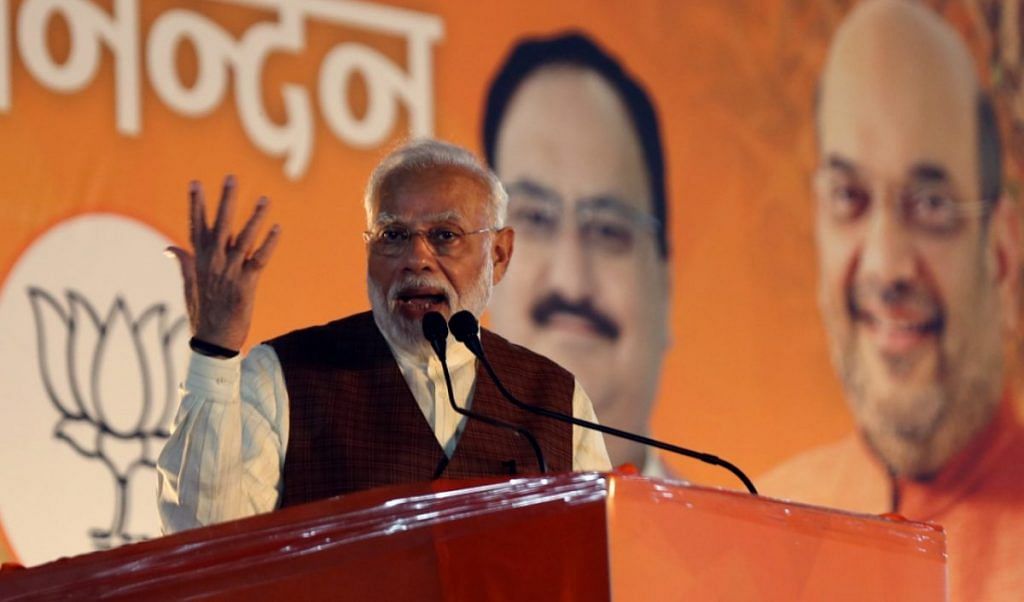As Prime Minister Narendra Modi travels to Brazil Wednesday for the BRICS summit, his tenth visit abroad since he came to power again six months ago, he will be keeping one eye on the unfolding political crisis in Maharashtra. Because what happens in Maharashtra will not only have an impact on politics in India — elections in Jharkhand and Delhi are around the corner — but it will also influence the Modi government’s reputation abroad.
But there’s another story that’s waiting to be told this week and that is the presidential elections in Sri Lanka that takes place on 16 November.
Also read: How Asia transformed from the poorest continent to a global economic powerhouse
A crucial election next door
Few other places have had such a grip on India’s imagination like Sri Lanka — not just because of the Ramayana connection but because of the contemporary ethnic conflict between the majority Sinhalese and the minority Tamils, and the more recent Chinese push into the pearl-drop island that simulates paradise in the Indian Ocean.
The top contenders are Gotabaya Rajapaksa of the Sri Lanka Podujana Peramuna (SLPP), the powerful former defence minister and brother of the formidable former president Mahinda Rajapaksa; and United Nationalist Party (UNP) candidate Sajith Premadasa, cabinet minister for housing, construction and cultural affairs and son of former president Ranasinghe Premadasa, who was assassinated by a suicide bomber on May Day in 1993.
With four days to go for the voting, the contest in Sri Lanka is said to have become very close.
The never-ending controversy about Gotabaya’s US citizenship has resurfaced, with a Buddhist monk sitting on a fast demanding proof from the presidential candidate that he has indeed renounced it. The women voters are said to be somewhat aloof to Gotabaya’s nationalist rhetoric. And then there is the response to the terrible Easter Sunday attacks in April, in which more than 250 people were killed by suicide bombers owing allegiance to a local militant Islamist group, National Thowheeth Jama’ath.
Gotabaya’s election manifesto promises to improve relations with India. He probably suspects that one of the reasons for his brother Mahinda Rajapaksa’s shock defeat to Maithripala Sirisena of the New Democratic Front (NDF) in 2015 was due to Delhi’s unhappiness with Mahinda’s increasing proximity to China. Although Mahinda Rajapaksa returned as prime minister in 2018 for a few weeks, ironically brought back by Sirisena, Sri Lanka’s Supreme Court and its lawmakers refused to second the move and brought back Ranil Wickremesinghe in the PM’s chair.
Also read: ‘Like China, India should invest across Indo-Pacific to ensure regional security’
New Delhi can’t look away
Delhi has worked closely with both Rajapaksa brothers before. Mahinda was president and Gotabaya was defence minister when the 26-year-long war against the LTTE was finally won in 2009. Manmohan Singh as the prime minister, Pranab Mukherjee as the external affairs minister and Shiv Shankar Menon as the national security advisor held their noses as the Rajapaksa brothers carried out the mother of all human rights violations against the LTTE cadres, including the killing of Prabhakaran’s 12-year-old son.
Meanwhile, western countries, including Norway, hoped that Prabhakaran’s family could be given safe passage out of Jaffna. But the Indian naval fleet had blockaded that route – allowing the Rajapaksas to finish off the terror group that had also assassinated former Prime Minister Rajiv Gandhi.
This potboiler tale now has a second chapter. Wickremesinghe has given way to Premadasa Jr to be the UNP’s presidential candidate, but still hopes he can somehow be the prime minister. But Sajith has the support of the moderate Tamil parties, the Tamil National Alliance, and hopes he can bring them further into the mainstream.
The irony is compounded because Sajith’s father, Ranasinghe Premadasa, was believed to have been keeping connections with the LTTE and encouraged them to fight the Indian Peace-Keeping Force in Sri Lanka in the late 1980s. According to Shekhar Gupta, writing here, Sajith’s father even supplied arms to the LTTE; but the Tamil-Lankan terrorist group didn’t spare him either, sending out a suicide bomber with a cyanide capsule to assassinate him in May 1993.
Certainly, it isn’t fair to judge the 52-year-old Sajith through the prism of his father’s actions. And yet, India is very quiet — memories of the past are still strong in some parts of the government. Once upon a time, strong men like former foreign secretary and high commissioner to Sri Lanka J.N. Dixit revelled in the description of ‘Viceroy’; these days, high commissioner Taranjit Sandhu would rather focus on trade, humanitarian aid, tourism and cutting ribbons for the entry of PVR Cinemas into Sri Lanka.
Also read: India only cares about national interest. And Nepal has been at the receiving end of it
Keeping China at bay
Not that Delhi isn’t resisting the expanding presence of the Chinese here. On the eve of PM Wickremesinghe’s India visit in October 2018, Colombo reversed its decision to award the building of 40,000 houses to the Indian construction firm ND Enterprises, after first giving it to the China Railway Beijing Engineering Group Co.
Sri Lanka knows well, as does the rest of the world, that the Chinese method is to loan large sums of money and cheap labour to the country it wants to woo, build highways and roads and opera houses (there’s a lovely one in the heart of Colombo). And when loan repayment becomes difficult, ask for equity in exchange.
It’s how China has tried to take over the Hambantota port in southern Sri Lanka, the home district of the Rajapaksas. It’s how China is expanding the Colombo harbour and building a port city that will be double the size of the capital.
That’s why it’s important, even as the Maharashtra crisis unfolds, to pay heed to the tiny country strategically located in the heart of the Indian Ocean. The presidential elections later this week are a start.
